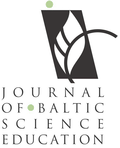THE IMPACT OF PROFESSIONAL DEVELOPMENT IN INQUIRY-BASED METHODS ON SCIENCE TEACHERS’ CLASSROOM PRACTICE
| Title | THE IMPACT OF PROFESSIONAL DEVELOPMENT IN INQUIRY-BASED METHODS ON SCIENCE TEACHERS’ CLASSROOM PRACTICE |
| Publication Type | Journal Article |
| Year of Publication | 2020 |
| Authors | Bernard, P, Dudek-Różycki, K |
| Journal | Journal of Baltic Science Education |
| Volume | 19 |
| Issue | 2 |
| Start Page | 201-219 |
| Pagination | Continuous |
| Date Published | April/2020 |
| Type of Article | Original article |
| ISSN | 1648-3898 |
| Other Numbers | E-ISSN 2538-7138 |
| Keywords | in-service teachers, inquiry-based learning, professional development, science education |
| Abstract | Inquiry-based methods have become very popular in science education all over the world. In Europe, they were strongly advocated in years 2007-2013 within the 7th EU Framework Programme projects, and in that time, in many countries teacher educational programmes (TEP) in inquiry were developed and implemented. However, there has been limited information on how effective those trainings are, and how teachers bring theory into practice. Therefore, the aim of this research was to determine the impact of training in inquiry-based methods on the teachers’ professional practices. The training consisted of two stages: I – one-week-long core training, and II – one-year-long extended support. Ninety-two science teachers participated in the research. It had a quantitative character and was based on a self-evaluation sheet that was completed three times: before the training, a month after the training, and a year after the training. The research results revealed current Polish science teachers’ practices related to facilitating learning by inquiry and identified the inquiry’s features that were immediately adopted by teachers, those that were adopted after a longer period, and finally, those that were not implemented at all. These results can be especially useful to educators who design and run TEPs in inquiry-based teaching and learning. |
| URL | http://oaji.net/articles/2020/987-1586941315.pdf |
| DOI | 10.33225/jbse/20.19.201 |
| Refereed Designation | Refereed |
| Full Text |
